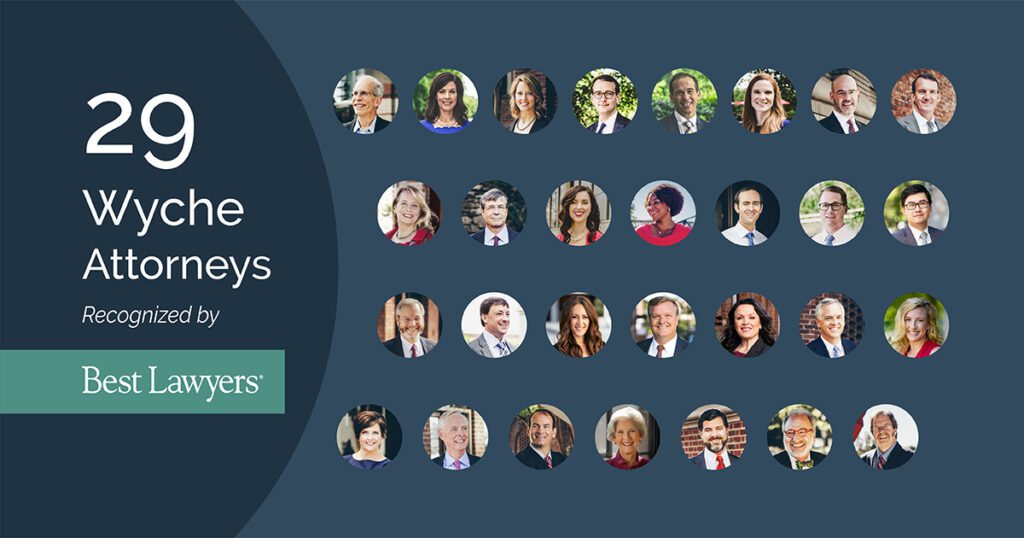Prepared by Ted Gentry
December 2013
Social Media and the Workplace Part III
In this month’s edition of Wyche at Work we will end our three-part series on social media in the workplace. In previous editions we have outlined the dangers of accessing employee/applicant-owned media social accounts and delved into the ways the National Labor Relations Board limits an employer’s ability to restrict employee conduct online. This month, we will close out our series by taking a deeper look into creating bring-your-own-device policies and crafting company social media ownership policies.
Bring-Your-Own-Device Policies
Employers with bring-your-own-device, or BYOD, policies allow employees to access and perform work with their own desktops, laptops, tablets, and/or mobile devices. This offers numerous benefits for employees (flexible work hours), employers (reduced fixed costs), and customers (increased access to service) alike.
While implementing a BYOD policy does have its benefits, employers should be aware of the legal and practical ramifications of doing so.
Legal risks include, among other things:
- non-exempt employees working more than a 40-hour week, resulting in (i) an effective wage below the hourly minimum and/or (ii) employer liability for overtime;
- employees using their devices to discriminate against or harass fellow employees and creating a hostile work environment; and
- employees accessing and transmitting sensitive employment records (social security numbers, bank accounts, etc.), confidential client information, or employer trade secrets to third parties, either voluntarily or as a result of hacking.
Practical concerns include determining how to:
- reimburse employees for the devices they use to perform work;
- access devices to update security programs, wipe sensitive data, and perform other maintenance functions;
- retrieve data that has been accidentally deleted; and
- deal with devices that have been lost or stolen, or that belong to former employees.
Having a written BYOD policy goes a long way in tackling these risks and concerns. We are happy to assist you in writing or reviewing a policy that is tailored to the needs of your workforce, demands of your customers, and realities of the legal landscape. These policies should be frequently updated to address the changing technological environment we work in.
Ownership of Company Social Media Accounts
The changing technological environment has seen companies increasingly use social media to connect with potential customers and retain long-term customers. This has made social media accounts, and their attendant followers and connections, more valuable to employers and employees alike. In fact there have been an increasing number of lawsuits filed to determine whether a departing employee who previously ran his or her employer’s social media account owns that account.
Although ownership of company social media accounts is a relatively new legal issue, employers should be aware of general best practices that have emerged from case law so far. Courts are more likely to find that employers, and not employees, own a company social media account when the employer:
- references the company’s ownership of the social media account in any employment agreements and/or restrictive covenants it has with employees with access to the account;
- focuses the content of the company’s social media account on the company, its business and customers, and not on the individual thoughts or personality of the employee running the account;
- maintains the company’s ability to select, and alter, the password to the social media account; and
- drafts a written policy that outlines which employees are permitted to use the social media account, what type of information they are allowed to post, and the company’s ownership of the contents of the account and its followers.
Do not hesitate to contact Wyche with any questions or concerns you may have about social media and the workplace. Stay tuned to Wyche at Work for future updates on this rapidly developing area of law.
Responding to EEOC Charges: Are Attorneys Necessary?
The vast majority of federal discrimination laws require employees to file a discrimination charge with the Equal Employment Opportunity Commission before pursuing litigation against their employer. Once the EEOC receives a discrimination charge, the EEOC initiates an administrative enforcement process to investigate the merits of the charge and determine whether to (i) attempt to settle the charge with the employer, (ii) file a lawsuit against the employer, or (iii) permit the charging employee to file a lawsuit against the employee.
Employers facing discrimination charges are not required to retain legal counsel during the EEOC’s investigation. However, seeking the advice of an attorney is generally a good idea for three key reasons.
First, attorneys have experience and can assist in aspects of the administrative enforcement process that resemble traditional litigation by:
- implementing legal holds to ensure that employers comply with the EEOC’s request for responsive documents,
- identifying and preparing witnesses to respond to EEOC interview requests,
- drafting an official position statement to the EEOC which outlines the employer’s defenses to the discrimination charge, and
- evaluating the strength of the charging party’s case for settlement/mediation purposes.
Second, attorneys can help employers generate their own confidential internal investigations during the administrative enforcement process so employers may better understand the legal ramifications of their past and current employment practices. These exercises can provide valuable lessons to deter future issues or charges. If done correctly, the results of any legal advice generated from these internal investigations may be protected by the attorney-client privilege.
Third, attorneys often eventually get involved in the EEOC charge process. At the end of the administrative enforcement process, either the EEOC or the charging employee may file a lawsuit against the employer. The EEOC’s investigation and the employer’s position statement may be used as evidence in the resulting lawsuit. Having an attorney from the outset can help employers (i) establish a favorable record for the lawsuit and (ii) maintain consistent factual assertions and legal defenses.
Dealing with EEOC charges are a part of the current business landscape. The EEOC receives nearly 100,000 discrimination charges per year from private-sector employees. The EEOC trumpeted that employers had to pay a record $372.1 million in monetary relief in the most recent administrative enforcement year. These numbers justify getting counsel involved at the EEOC charge level.
The EEOC website offers a good overview of the EEOC charge handling process for employers, and we would be glad to assist as you establish or review your own process.
Looking Back – 2013 in Review
Employment law headlines in 2013 featured the implementation of the Affordable Care Act, the continued bold initiatives of the National Labor Relations Board, background checks, social media, and benefits for same-sex partners.
On the state level, South Carolina saw its unemployment rate drop to 7.5% in October, the lowest since 2008. As we reported in the June edition of Wyche at Work, the South Carolina legislature took legislative and regulatory action related to health insurance, workers’ compensation and project labor agreements.
Looking Ahead
Federal Agencies Release Unified Agendas
Federal agencies, including the Department of Labor and Equal Employment Opportunity Commission, have offered employers a preview of what to expect in 2014 through the release of their fall 2013 unified agendas and regulatory plans. These publications identify agency priorities and trends:
Department of Labor
In its Statement of Regulatory Priorities, the DOL states that it will continue its emphasis on Plan/Prevent/Protect, openness and transparency, risk reduction, and regulatory review and burden reduction. The DOL anticipates this strategy will “enable the Department to create opportunity — both for businesses to comply in the way that is most efficient, least burdensome, and in line with their existing business practices, and for workers to labor in safe and healthy environments.”
National Labor Relations Board
The DOL’s Agency Rule List includes a controversial rule concerning the NLRB’s “advice” exemption from reporting requirements that apply to employers and other persons in connection with persuading employees about the right to organize and bargain collectively. Many are concerned that the final rule would interfere with the attorney-client privilege and communications between employers and employees. According to the agenda, the final rule will be released in March 2014.
Equal Employment Opportunity Commission
Of note on the EEOC’s Agency Rule List is a pending final rule to adjust for inflation the civil monetary penalty for violation of EEO notice posting requirements under Title VII of the Civil Rights Act, the Americans with Disabilities Act, and the Genetic Information Nondiscrimination Act. The EEOC anticipates final action on the rule by September 2014.
Health and Human Services
In conjunction with implementing the Affordable Care Act, the Health and Human Services’ Agency Statement of Regulatory Priority enforces the agency’s mission to protect the health of all Americans by issuing rules that will
increase access to health care for all Americans and strengthen the Medicare program, the nation’s largest insurance provider; support the President’s commitment to implement strategies to reduce gun violence; build from previous experiences to safeguard the nation’s food supply; promote children’s health and well-being through programs that target those critical early years; arm consumers with information to help them make healthy choices; and marshal the best research and technology available to streamline and modernize the health care delivery and medical product availability systems.
We will track progress on these agenda items and keep you posted through future editions of Wyche at Work.
Notice Requirements
The beginning of a new year is always a good time to make sure that employment law notices required by South Carolina and federal agencies are up to date. This month the U.S. Citizenship and Immigration Services released revised Notice of E-Verify Participation and Right to Work posters, which are required of all E-Verify users. The revised posters require less ink to print, but previous versions are still acceptable. While on the topic of E-Verify, the USCIS has also revised Memoranda of Understanding (MOUs). According to a Fact Sheet, the E-Verify enrollment process will not change, and existing E-Verify users are not required to execute a revised MOU. They will, however, be bound by the revised MOU that applies to their access method.
Multi-State Employers
If your company has employees outside South Carolina, it would be a good time to make sure you are in compliance with laws that may vary from state to state. Some considerations include:
- Minimum wage – Some states will see increases in minimum wages effective January 1, 2014.
- Requesting social media passwords – As we have discussed before, requesting social media access or passwords from applicants or employees is outlawed in several states.
- Same-sex marriage – The U.S. Supreme Court’s ruling in United States v. Windsor has had a ripple effect on tax and leave issues and is complicated by the fact that some states recognize same-sex unions while others do not. Federal agencies should issue further guidance on this topic in 2014.
- Background checks – Some states may have requirements in addition to those spelled out by the federal Fair Credit Reporting Act and there is an emerging “ban the box” movement restricting certain criminal background inquiries.
Anytime you hire or employ individuals in another state, be sure to take care to ensure compliance with all applicable employment laws for those states. If you have any particular questions, please do not hesitate to call us.
Upcoming Series on Employee Handbooks
- Why should my company have an employee handbook?
- Which policies are essential, and which are optional?
- We have had an employee handbook in place for years; when should we review and update our policies?
Stay tuned as Wyche at Work kicks off 2014 with a series on employee handbooks, covering these and other topics.
Meanwhile, Wyche at Work wishes you a wonderful holiday season and a prosperous new year.
If you have any questions about these or other workplace law topics, please contact Ted Gentry.
This update is provided by Wyche for educational and informational purposes only and is not intended and should not be construed as legal advice.






